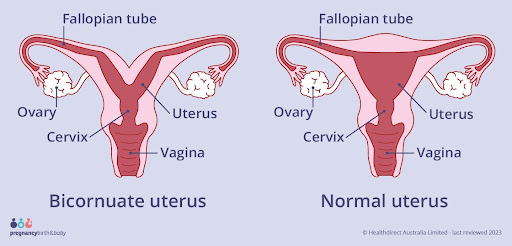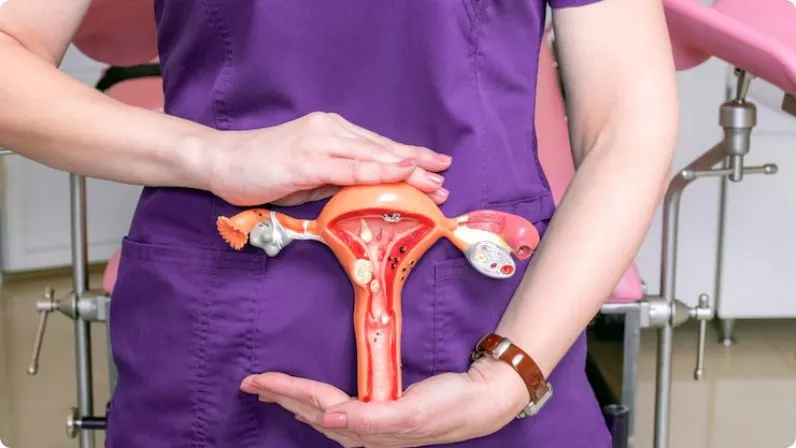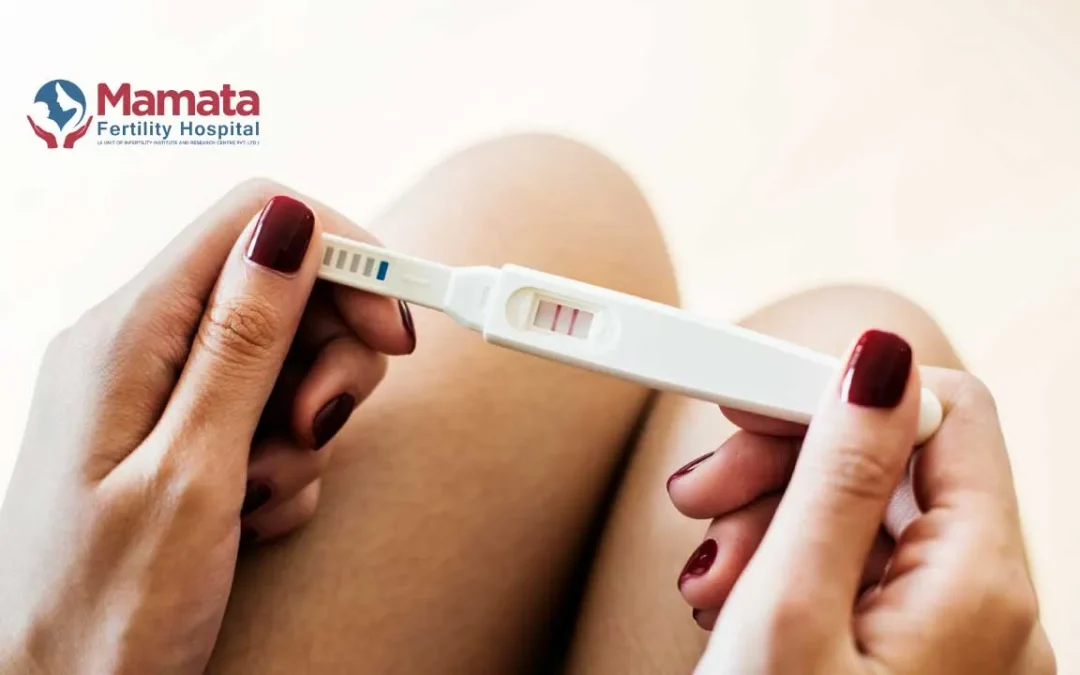Bicornuate Uterus
At Mamata Fertility Hospital in Secunderabad, we believe in empowering women with reliable information about their reproductive health.
A bicornuate uterus is a rare congenital condition that can affect fertility and pregnancy outcomes. While it might sound alarming, many women with this condition can still conceive and carry a healthy pregnancy with the right care and guidance.
This article provides an easy-to-understand explanation of what a bicornuate uterus is, its causes, and the treatment options available.
For Appointments, Please Call:
More On Bicornuate Uterus
What is a Bicornuate Uterus?
The uterus, or womb, is normally pear-shaped and provides the space for a baby to grow during pregnancy. A bicornuate uterus, often referred to as a “heart-shaped uterus,” is a structural condition where the uterus has two cavities instead of one.
This condition occurs during fetal development when the two ducts that form the uterus (called Müllerian ducts) do not completely fuse together. The result is a uterus with two sections, or “horns,” that share a single opening to the cervix.

Types of Bicornuate Uterus
A bicornuate uterus can vary in its severity:
-
- Complete Bicornuate Uterus: The two cavities are entirely separate and distinct.
- Partial Bicornuate Uterus: The division between the two cavities is less pronounced, creating a partial separation.
While it may sound scary, many women with a bicornuate uterus experience no health issues. However, in some cases, it can affect fertility or pregnancy.

Causes and Risk Factors
A bicornuate uterus is a congenital condition, meaning it is present from birth. Here’s what you need to know about its causes and risk factors:
Causes
-
- Developmental Issue: During fetal development in the womb, the Müllerian ducts fail to fully merge, leading to the formation of two uterine cavities.
- Genetic Factors: Although not always hereditary, genetic factors may increase the likelihood of this condition.
Risk Factors
There are no specific external factors that directly cause a bicornuate uterus. However, women born into families with a history of uterine abnormalities may have a slightly higher risk of having this condition.
It’s important to remember that a bicornuate uterus is not caused by anything a mother does or does not do during pregnancy.
Symptoms and Diagnosis
A bicornuate uterus does not always show obvious symptoms. Many women live with the condition without realizing it. However, some experience noticeable signs.
Common Symptoms
-
- Irregular Periods: Some women may have inconsistent menstrual cycles.
- Recurrent Miscarriages: Having more than one pregnancy loss can be a sign of uterine abnormalities.
- Pelvic Pain: Periodic discomfort or pain in the lower abdomen may occur.
- Premature Labor: Women with this condition may have a higher likelihood of delivering early.
If you experience any of these issues, it’s a good idea to consult a healthcare provider.
Diagnostic Approaches
At Mamata Fertility Hospital, we use advanced diagnostic methods to identify a bicornuate uterus accurately. These include:
-
- Ultrasound: A detailed 3D ultrasound provides a clear view of the uterine structure.
- Hysterosalpingography (HSG): This X-ray procedure uses a special dye to examine the uterus and fallopian tubes.
- MRI (Magnetic Resonance Imaging): This imaging test offers further clarity on the extent and type of uterine abnormality.
- Hysteroscopy: A small camera is inserted into the uterus to inspect its structure and identify abnormalities.
These diagnostic tools help doctors determine the presence and type of bicornuate uterus, which is crucial for planning treatment.
Impact on Fertility and Pregnancy
A bicornuate uterus does not always lead to infertility, but it can increase the chance of complications during pregnancy. Understanding these risks is essential for proper care and management.
Fertility
Most women with a bicornuate uterus can conceive naturally without much difficulty. However, in some cases, the uterine shape may:
-
- Make it harder for the fertilized egg to implant properly.
- Contribute to an increased risk of early pregnancy loss.
Pregnancy Complications
Women with a bicornuate uterus may face challenges during pregnancy due to the limited space inside the uterus. Possible complications include:
-
- Recurrent Miscarriages: The abnormal shape of the uterus may disrupt fetal development, leading to pregnancy loss.
- Preterm Birth: Babies may be born earlier than expected because the uterus cannot stretch fully.
- Breech Presentation: Due to limited space, the baby may not be positioned head-down, which can lead to difficulties during delivery.
It’s crucial for women with a bicornuate uterus to work closely with their healthcare provider for regular monitoring and support throughout pregnancy.
Treatment and Management Options
Treatment depends on whether the condition causes symptoms or complications. Many women do not need intervention unless they face fertility issues or repeated pregnancy losses.
Non-Surgical Options
-
- Monitoring: Women without significant symptoms may only need regular check-ups and supportive care during pregnancy.
- Fertility Treatments: If conception is challenging, options like ovulation induction or in-vitro fertilization (IVF) may assist in achieving pregnancy.
Surgical Options
-
- Metroplasty: This minimally invasive procedure reshapes the uterus to create one unified cavity, improving the chances of a successful pregnancy.
- Laparoscopic Surgery: Advanced laparoscopic techniques allow for precise correction with reduced recovery time.
At Mamata Fertility Hospital, our skilled team offers these procedures with the highest level of care and expertise.
Lifestyle and Dietary Recommendations
Adopting healthy habits can support overall reproductive health and improve outcomes in women with a bicornuate uterus.
Nutrition Tips
-
- Iron-Rich Foods: Iron supports healthy blood levels, which is particularly important during pregnancy. Include spinach, lentils, and fortified cereals in your diet.
- Calcium Sources: Strong bones and muscles help the body support a growing baby. Enjoy yogurt, milk, and leafy greens.
- Hydration: Drinking plenty of water helps improve overall health and reduces cramps.
Healthy Lifestyle Practices
-
- Manage Stress: Practices like yoga or meditation can help you feel calm and improve hormonal balance.
- Exercise: Light to moderate exercises, like walking or swimming, can promote uterine health. However, always talk to your doctor before starting a fitness routine during pregnancy.
- Avoid Smoking and Alcohol: These can negatively affect fertility and pregnancy outcomes.
By following these steps, women can enhance their reproductive health and improve their quality of life.
Frequently Asked Questions (FAQs)
1. Can a bicornuate uterus cause infertility?
Not necessarily. Many women with a bicornuate uterus conceive naturally and have healthy pregnancies. However, some may need fertility support.
2. Is surgery always required for a bicornuate uterus?
No. Surgery is recommended only if the condition causes significant symptoms or pregnancy complications.
3. Can a woman with a bicornuate uterus have a normal delivery?
Yes, though the risk of complications like breech presentation might lead to the need for a cesarean delivery in some cases.
4. How is a bicornuate uterus detected?
It is usually diagnosed through imaging tests like ultrasounds, MRIs, or hysteroscopies during evaluations for fertility or pregnancy complications.
5. Is a bicornuate uterus preventable?
No. This is a congenital condition, meaning it develops before birth and cannot be prevented.
At Mamata Fertility Hospital, we provide exceptional care and expertise in managing uterine abnormalities like a bicornuate uterus. If you are concerned about your fertility or experiencing pregnancy challenges, we are here to guide you every step of the way. Schedule a consultation today and take the next step toward a healthy future.
Reviewd By

Dr Aarti Deenadayal Tolani
Clinical Director, Scientific In-Charge & Fertility Consultant
MBBS, MS ( OBGYN), FICOG
Expert in Reproductive Endocrinology, Infertility, Advanced Gynaec Ultrasound, and Faculty at Mamata Fertility Hospital.
Blogs and Articles

How to Prevent Chemical Pregnancy?
Learn how to prevent chemical pregnancy with expert tips, medical advice, and emotional support. Consult Mamata Fertility Hospital Hyderabad for guidance.

What is Chemical Pregnancy?
Understand chemical pregnancy, its causes, symptoms, and relation to IVF. Find support and expert care to move forward with hope.

How to Avoid Pregnancy Naturally?
How to Avoid Pregnancy Naturally?PregnancyPreventing pregnancy is a deeply personal decision that requires careful consideration and understanding. Many women of reproductive age seek natural family planning methods as a way to avoid pregnancy without the use of...

